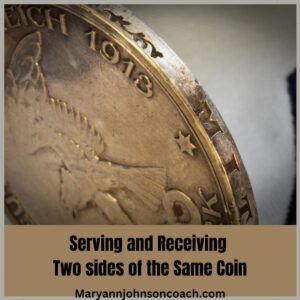 Let me tell you a moving story about my grandpa. My grandmother had passed away, and my grandfather who was in his late eighties, was living with his daughter and fading. I visited him and he was happy to see me. We talked for a while and then I visited with my Aunt Carol Lynn.
Let me tell you a moving story about my grandpa. My grandmother had passed away, and my grandfather who was in his late eighties, was living with his daughter and fading. I visited him and he was happy to see me. We talked for a while and then I visited with my Aunt Carol Lynn.
Later, I made a trip down the hall to the bathroom. As I got close to the door of the room where my grandpa slept, I heard him crying. I stepped in, laid on the bed beside him, and asked, “Grandpa, what’s the matter?” He looked at me with tear-filled eyes and replied, “Time goes by so fast, I can’t catch it.” Grandpa told me how grateful he was for his life and family, how much the time with them had meant to him. He talked about those he had served and those who had served him. Hence the tears, it was all going by so fast.
His answer surprised me because I always thought that as you grow older time would slow down. Now, I’m almost 75 and I know the truth of his words. I never suspected this when I was young. You can’t know until you get there! This story of my grandfather reminds me of two great gifts life offers, serving and receiving.
In 2012, because of an experience, I decided to be more open to receiving help from others. Trust me when I say my progress has been slow! I’ve always prided myself on my independence, ingenuity, and ability to do whatever needs to be done. I have always felt confident in “doing it myself.” However, it’s a challenge to do everything by yourself, all the time, and you miss out on the other side of the coin, the value that comes from receiving. I’ve had to learn this the hard way.
My inspiration to work on allowing others to share in my burdens came because of two people in my life that I loved, both with significant special needs. One was my unofficially adopted daughter, Michelle, in her thirties, and my granddaughter, Maggie. They both had cerebral palsy. Here is their story and how it affected me.
Two Girls Who Understood Both Sides of the Coin
For my adopted daughter, Michelle, time, and her condition took their toll. She was in a wheelchair, had lost many of her former abilities, and lived in a nursing home. She needed help with most daily activities. She passed away a few years ago and has been missed. Maggie, my granddaughter, who is eighteen, was six in 2012. Maggie can’t use her legs and using her hands is a challenge. She cannot feed herself and does not speak. My special needs girls could do virtually nothing on their own.
At Christmastime I had the privilege of spending a full day with Michelle, in the nursing home, helping her make her Christmas presents. With help, Michelle frosted and decorated the cookies and cupcakes I had baked. I held the item and turned it slowly while she did the frosting. Then I would hold and turn it while she sprinkled the decorations. We then bagged the items.
She made a couple of pies for special friends. Michelle did her best to roll out the pie dough, but pressure was an issue. So, I helped her press down while she rolled. Then I assisted her in grabbing hold of the circle of dough and plopping it into the pan. I cut off the excess and Michelle crimped the edges. We baked them in the nursing home oven. She painted pictures for others. I got water, handed her brushes, and turned the paper to the correct angle periodically.
When Michelle gave out her presents on Christmas Eve and Christmas Day she was pleased. She commented to everyone that she had made them all by herself and was proud. She felt the full joy of having done this project. My helping had not diminished her joy or made her feel less than.
I had observed these same feelings while working with Maggie when she was 6 and now when she is eighteen. It doesn’t seem to matter how much help she needs, when it’s done it belongs to her. She takes complete pride and ownership in a job well done. Both Maggie and Michelle love doing it ‘all by themselves.’
I found myself judging this behavior to some degree, back then. After all, they hadn’t really done it all by themselves. All the while, despite my love for these girls, I was massaging my own pride in my many accomplishments and my ability to be so independent. What I had yet to learn was that help from others doesn’t diminish our part or our success in the result. These two beautiful souls understood both sides of the coin perfectly!
Later, as we entered the new year, 2013, I thought deeply about that holiday season and a scripture came to my mind. “Are we not all beggars”? Mo 4:19 Do we not all need a great deal of help every day to both receive and give good gifts to those around us; serving and receiving – two gifts that go hand in hand. Are we not all beggars? I decided then to practice receiving. As I said, it’s been a journey and not an easy one.
As we enter the new year, it’s valuable to stop and evaluate our lives, the opportunity to raise wonderful families and serve others, neighbors, friends, family, and strangers. But we also need to contemplate the value and necessity of receiving from those same people, our family, neighbors, friends, and sometimes strangers. We can lift, teach, and help, but we can also be taught, served, and have our burdens lightened as long we are open to both gifts – serving and receiving.
For behold, are we not all beggars? Do we not all depend upon the same Being, even God, for all the substance which we have…Mo 4:19 Receiving help in any form is not a sign of weakness, it’s a sign of our humanness and an acknowledgment that serving and receiving are two sides of the same blessed coin.
A Real Life Example
As I finalize this message, it is the last day of January 2025. Yesterday, I came face to face with what I have shared with you today. Since August of 2024, I have had some medical issues. I had an appointment in May, but the situation required help sooner. Next week I will be seeing the specialist. My daughter planned to go with me because I need an advocate, so I am listened to and not seen as just another old lady. However, when we took the only earlier appointment they had, it was a date when Jodie was not available. What to do?
I want you to know this wasn’t the article I planned for today. I had worked on a different article earlier in the week. However, on Thursday, as I sat at the computer and looked at the articles I felt drawn to this piece. I read it and decided to use it. That evening my youngest sister stopped by with two of her grands. They wanted a picture with my mom, the great-grandmother. It came out Jodie couldn’t be with me at my appointment. Nanette said, “Hey, I’ll drive down and go with you. I want that doctor to know you’re a writer, smart, and totally organized!” Then she gave me a big smile.
My immediate reaction was to say, “No, you can’t. You live over an hour away. That’s more than two hours on the road. I’ll be Ok.” My sister replied that she would make a trip out of it. One of her sons and his family live just twenty minutes from me, in fact, in the town where the doctor’s appointment is. I was again going to protest. This was my younger sister and I am fully capable of going alone, asking questions, and advocating for myself. Then I had a thought, “Mary Ann, isn’t it interesting that this is the article you chose to work on for this Sunday?” That took me by surprise. I knew I had been reminded of the goal set back in 2012. Needless to say, Nanette is coming and will be helping me out at this important appointment.
This may be something you need to work on, as I have had to. There’s no glory in doing everything by yourself. There is only a heavier burden and oftentimes, loneliness, as you struggle on. It’s a choice! Learn to receive as well as serve. This is a practice, and you can learn to do it with grace, as did my beautiful girls.



 I have the privilege of having a granddaughter with severe cerebral palsy. Whenever anyone finds out they always respond with, “Oh, I am so sorry.” They don’t need to be sorry. Maggie is one of the happiest human beings I know. Her mother loves her and magnificently cares for her. I have the privilege of living in a four-generation home and I see what having a special needs child can entail. There is no getting around how challenging it is, but there is also no getting around how rewarding it can be, how you are changed and privileged to grow.
I have the privilege of having a granddaughter with severe cerebral palsy. Whenever anyone finds out they always respond with, “Oh, I am so sorry.” They don’t need to be sorry. Maggie is one of the happiest human beings I know. Her mother loves her and magnificently cares for her. I have the privilege of living in a four-generation home and I see what having a special needs child can entail. There is no getting around how challenging it is, but there is also no getting around how rewarding it can be, how you are changed and privileged to grow.
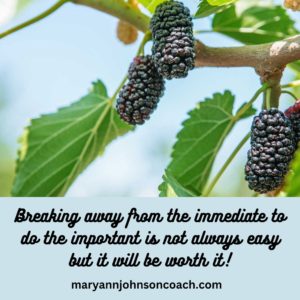
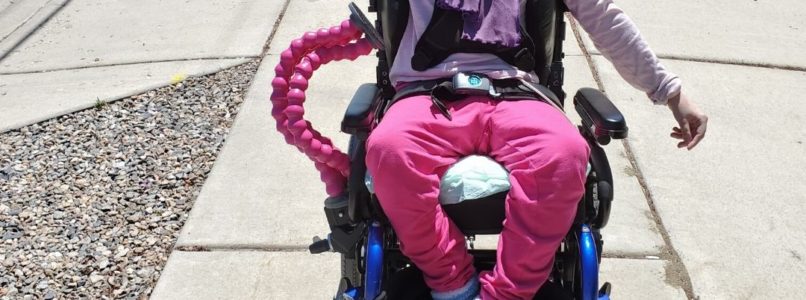
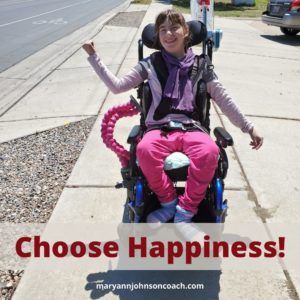 When the weather is good, I take my granddaughter Maggie for a walk. In the spring, summer, and fall, that’s almost every day. She has minimal use of her arms and hands and no use of her legs, so getting out for a walk is a real treat.
When the weather is good, I take my granddaughter Maggie for a walk. In the spring, summer, and fall, that’s almost every day. She has minimal use of her arms and hands and no use of her legs, so getting out for a walk is a real treat.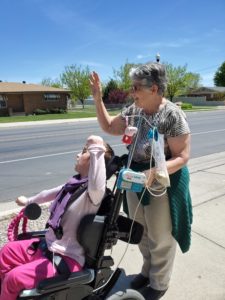 be happening in their day. It might have been a bad day. Maybe they had a fight with their spouse or are short on money or have some other significant problem. But for that moment, as they pass Maggie, they feel a spark of joy. Those who wave but don’t smile have the opportunity to have their spirits lifted but choose to stay down. They decide not to have their spirits lifted for even a moment from whatever is troubling them. And what about those who don’t see her or are distracted. Because they weren’t looking, they missed the opportunity to be lifted. They lost out on the gift.
be happening in their day. It might have been a bad day. Maybe they had a fight with their spouse or are short on money or have some other significant problem. But for that moment, as they pass Maggie, they feel a spark of joy. Those who wave but don’t smile have the opportunity to have their spirits lifted but choose to stay down. They decide not to have their spirits lifted for even a moment from whatever is troubling them. And what about those who don’t see her or are distracted. Because they weren’t looking, they missed the opportunity to be lifted. They lost out on the gift.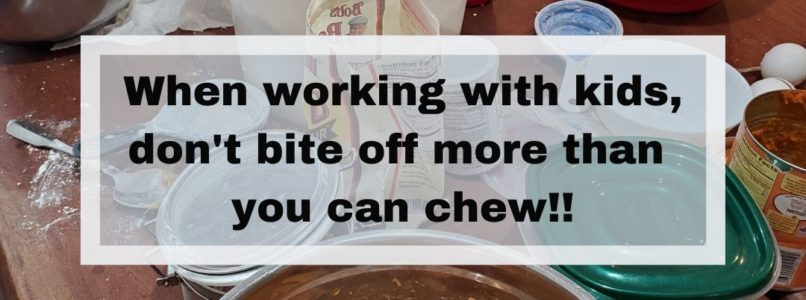
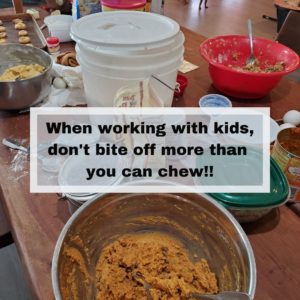 Keep It Simple
Keep It Simple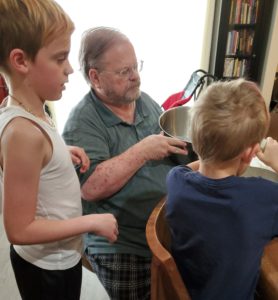 reasoned that he could help the two boys, one 12 and one 6. The 12-year-old wouldn’t need much help. I would help the girls, one 10 and one 14, with special needs. The 10-year-old is creative and fairly independent. That should work out alright.
reasoned that he could help the two boys, one 12 and one 6. The 12-year-old wouldn’t need much help. I would help the girls, one 10 and one 14, with special needs. The 10-year-old is creative and fairly independent. That should work out alright.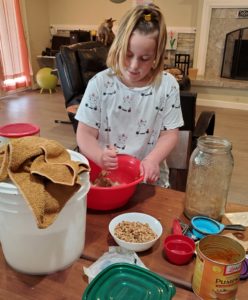 NOT! Don couldn’t manage two at a time and was totally involved with the six-year-old. That left me with three. As for the twelve-year-old, I discovered that when it comes to cooking, he needed a lot of help. And as far as the 10-year-old goes, she couldn’t read my cursive. Of course, her recipe card was in my cursive. Sigh. It was like trying to wrangle chickens. You’ve never done that. Well, trust me, it’s tiring!! And here is another thing. I am perfectly aware that expectations can do a good project in. I teach that. I am an expert.
NOT! Don couldn’t manage two at a time and was totally involved with the six-year-old. That left me with three. As for the twelve-year-old, I discovered that when it comes to cooking, he needed a lot of help. And as far as the 10-year-old goes, she couldn’t read my cursive. Of course, her recipe card was in my cursive. Sigh. It was like trying to wrangle chickens. You’ve never done that. Well, trust me, it’s tiring!! And here is another thing. I am perfectly aware that expectations can do a good project in. I teach that. I am an expert.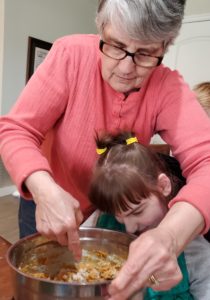 cream the sugar and shortening, no problem. Then they will cook their cookies, we will eat some and each will clean up their spot on the table. WHAT WAS I THINKING!!!
cream the sugar and shortening, no problem. Then they will cook their cookies, we will eat some and each will clean up their spot on the table. WHAT WAS I THINKING!!!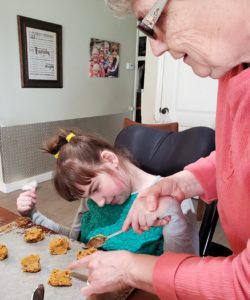 I have to say, that
I have to say, that 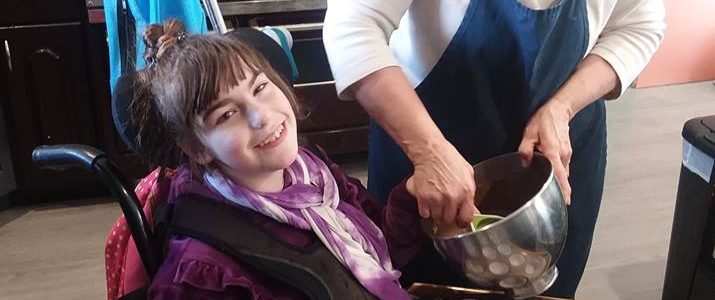
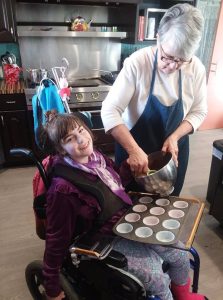 Recently, I posted a photo on Facebook of my twelve-year-old granddaughter making cupcakes. She has cerebral palsy and so it requires some special accommodation to cook with her. We’ve been cooking together now, for many years.
Recently, I posted a photo on Facebook of my twelve-year-old granddaughter making cupcakes. She has cerebral palsy and so it requires some special accommodation to cook with her. We’ve been cooking together now, for many years. 3-18-2010
3-18-2010 and the chair on the table. Jack, of course, took his position on one of the kitchen chairs.
and the chair on the table. Jack, of course, took his position on one of the kitchen chairs.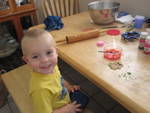 Next came the eggs. I showed Jack and Maggie how to break one and get the contents out. Woohoo!! Whacking eggs suited Jack just fine. He gave it a whack and voila! egg all over the table. Not to worry. We just picked out the eggshells and scraped the egg into the bowl. Good thing we started with a clean table.
Next came the eggs. I showed Jack and Maggie how to break one and get the contents out. Woohoo!! Whacking eggs suited Jack just fine. He gave it a whack and voila! egg all over the table. Not to worry. We just picked out the eggshells and scraped the egg into the bowl. Good thing we started with a clean table.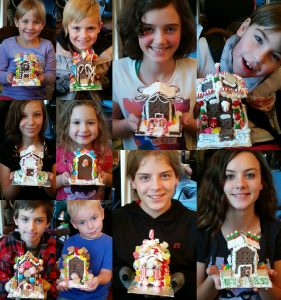 I could help 25-30 kids by myself. But I’m going to be honest here. It went so smoothly because the project was about me and not about the children.
I could help 25-30 kids by myself. But I’m going to be honest here. It went so smoothly because the project was about me and not about the children.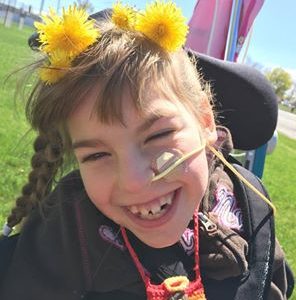
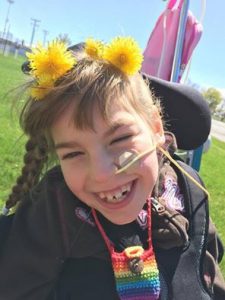 Five years ago I became my granddaughter Maggie’s aid at school.
Five years ago I became my granddaughter Maggie’s aid at school.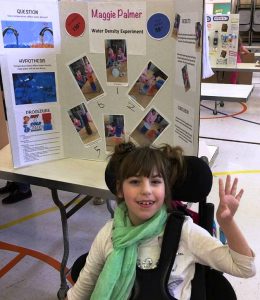 child” surprises me. How could stepping on such a little thing hurt so badly? I shake my head in wonder as the tears flow. Just the other day one of Maggie’s little next-door friends said to me, in her frustration of not being able to play with Maggie in ways that she wanted to, “I wish Maggie didn’t have cerebral palsy.” Her comment sucked the air out of my lungs, and I was speechless. What should I think about this, about her? I didn’t know.
child” surprises me. How could stepping on such a little thing hurt so badly? I shake my head in wonder as the tears flow. Just the other day one of Maggie’s little next-door friends said to me, in her frustration of not being able to play with Maggie in ways that she wanted to, “I wish Maggie didn’t have cerebral palsy.” Her comment sucked the air out of my lungs, and I was speechless. What should I think about this, about her? I didn’t know. A Sherpa has come to be known as someone who guides another along a challenging journey. A Sherpa takes upon themselves the heaviest burdens of the expedition. A Sherpa understands their traveling companion may be inexperienced, awkward, and fearful as they walk through territory that is not their native country, and they are patient with that.
A Sherpa has come to be known as someone who guides another along a challenging journey. A Sherpa takes upon themselves the heaviest burdens of the expedition. A Sherpa understands their traveling companion may be inexperienced, awkward, and fearful as they walk through territory that is not their native country, and they are patient with that. Jodie is the mother of four children, ages 5, 8, 10, and 12. Her oldest daughter, Maggie, has severe cerebral palsy. Although her energies are focused on the busy season of raising a young family, she is also a writer, teacher, mentor, and coach. She has spent many years helping parents create their own unique vision, master plan and custom-made systems for the education of their family. She is also the past president of the Midwives College of Utah and currently serves as a member of their board of directors and a personal student mentor. Jodie’s secret wish is to ride cross-country on a motorcycle in black leather pants.
Jodie is the mother of four children, ages 5, 8, 10, and 12. Her oldest daughter, Maggie, has severe cerebral palsy. Although her energies are focused on the busy season of raising a young family, she is also a writer, teacher, mentor, and coach. She has spent many years helping parents create their own unique vision, master plan and custom-made systems for the education of their family. She is also the past president of the Midwives College of Utah and currently serves as a member of their board of directors and a personal student mentor. Jodie’s secret wish is to ride cross-country on a motorcycle in black leather pants.